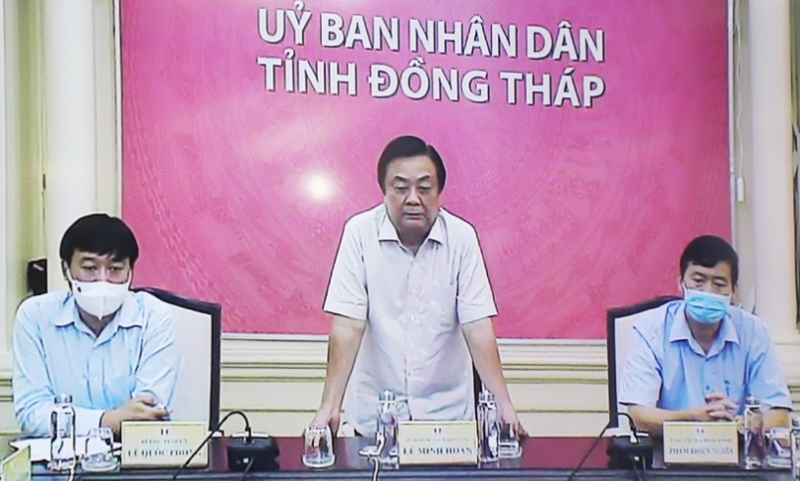Currently, there are 26,040 cooperatives nationwide, including 18,327 agricultural cooperatives. In the period 2016-2020, the collective economy and cooperatives have directly contributed about 4.8% of the GDP of the country and indirectly more than 30% of GDP through the added value of the member economy…
Minister Le Minh Hoan chaired the conference from Dong Thap.
The above information was presented at an online conference summarizing 20 years of implementing Resolution No. 13-NQ/TW on continuing to innovate, develop and improve collective economic efficiency (Resolution 13) and 10. implementation of the Law on Cooperatives 2012 in the agricultural sector, chaired by Minister of Agriculture and Rural Development Le Minh Hoan on October 19, 2021.
60% OF COOPERATIVES WORKING EFFICIENTLY
Dr. Le Duc Thinh, Director of the Department of Economic Co-operation and Rural Development, said that by the end of October 2021, the whole country has 18,327 agricultural cooperatives and 79 Unions of agricultural cooperatives with 3.23 million members; 34,871 agricultural cooperative groups (THT) with 628,000 members. The total capital of agricultural cooperatives is currently about 29,425 billion VND, on average each cooperative has a charter capital of 1.61 billion VND.
From 2013 to now, the number of agricultural cooperatives has increased rapidly, an average of nearly 800 cooperatives per year, more than three times higher in the 2017-2021 period (2012-2016). The proportion of agricultural cooperatives rated as good or good has increased from 10% (2013) to over 60% in 2020.
The total funding directly supported by the State for the development of agricultural collectives and cooperatives across the country over the past 20 years has reached about VND 8,180 billion. State budget support for agricultural cooperatives is concentrated in the period of 2013-2021 with about VND 7,283 billion, 8 times higher than the previous period (2001-2012).
Localities focus on supporting infrastructure development (VND 1,861 billion); science and technology support (1,206 billion VND); access to capital and cooperative development support fund (1,768 billion VND); training and fostering human resources (593 billion VND); trade promotion and market expansion (255 billion VND); supporting the implementation of projects and plans of association under Decree 98 (VND 1,105 billion)…
In 2020 alone, 96% of cooperatives have been transformed and reorganized; scale, quality and operational efficiency are improved; the rate of effective cooperatives reached 56%; total revenue reached more than 30,000 billion dong, profit after tax reached 2,900 billion dong, the average income of employees reached 4.3 million dong/person/month.
Mr. Tran Thanh Nam, Deputy Minister of Agriculture and Rural Development, emphasized that Resolution 13 and the Law on Cooperatives 2012 have created the driving force and development mechanism for the collective economy and cooperatives under the cooperative model. new commune.
Referring to the development perspective in the coming time, Deputy Minister Nam affirmed to focus more on the collective economy, taking agricultural cooperatives as the center to have appropriate investment policies; continue to improve the internal capacity of agricultural cooperatives, promote the influence of the collective economy on the community.
Accordingly, Deputy Minister Nam suggested that localities continue to review and perfect mechanisms and policies to develop agricultural cooperatives; promote human resource training, attract young trained cadres into cooperatives; encourage agricultural cooperatives to apply mechanization and high technology to production, processing and consumption.
At the same time, support agricultural cooperatives to access credit capital, invest in infrastructure for production and business, especially logistics infrastructure; improve the role of State management in the collective economy.
FOUNDATION OF RURAL ECONOMY
Minister of Agriculture and Rural Development Le Minh Hoan, said that in response to the practical requirements of development, especially from 2016 up to now, the Ministry of Agriculture and Rural Development has directed and implemented Resolution 13 and the Law on Rural Cooperative Development 2012 in a creative and effective way. As a result, the collective and cooperative economy has progressed in both quantity and quality; has overcome the long-standing shortcomings and increasingly affirmed the potential and development prospects.
According to Minister Le Minh Hoan, the Government discussed the story of economic recovery after the pandemic, how to improve the autonomy of the domestic economy and reduce foreign dependence. In the current context, in addition to attracting foreign investment, it is also necessary to strengthen internal strength.
“Along with the strength of enterprises, it is also necessary to pay attention to the collective economy and cooperatives. We care about eagles but also don’t forget the sparrows,” noted Minister Le Minh Hoan.
State investment in agriculture will not succeed without cooperatives, investment in science and technology for agriculture without cooperatives will also not succeed. To diversify products, including inputs and outputs, there is no other way to involve cooperatives.
Like the business community, a large number of cooperatives, small and medium enterprises in the agricultural sector are also making important contributions.
The minister confided: “Looking at the flow of people moving back to their hometown after the pandemic, it can be seen that the countryside is where people go and now is the place to pick them up. How do we revive the village to create a fulcrum for the people. There people cooperate with each other through vocational training, developing clubs”.
From that fact, Minister Le Minh Hoan suggested that localities pay real attention to the development of cooperatives, considering cooperatives as an integral part of the rural economy. “The new path for cooperatives cannot be overstated, why in developed countries, cooperatives still thrive, where cooperatives can do tourism, pull people back to the countryside to visit the countryside, thus people can love agriculture and rural areas more “, emphasized Minister Le Minh Hoan.
Affirming that he will pursue this goal, Minister Le Minh Hoan said that in the near future, it will attract public investment in logistics infrastructure for cooperatives so that cooperatives can improve their capacity and activate farmers to cooperate with each other.
The Ministry of Agriculture and Rural Development is preparing to submit to the Government a logictics program for the agricultural sector to limit the impact of supply chain disruptions through pandemics and natural disasters, in which cooperatives will be an important factor in the supply chain.
Source: vneconomy.vn



















